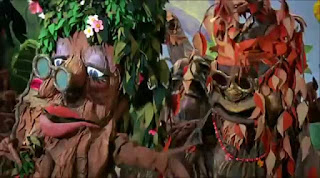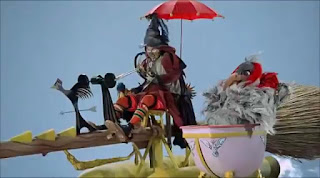In the summer of 2009, I was an awkward teenager who was getting into the discography of The Guess Who, and watched as many reruns of the edited 30-minute episodes of The Banana Splits Adventure Hour as she could. But none of those late-60s time capsules compare in being "(un)intentional period piece"s to the film adaptation of another Sid and Marty Krofft series.
Jack Wild as Jimmy
Al Melvin as H.R. Pufnstuf
(Puppeteered by Roberto Gamonet)
Billie Hayes as Wilhelmina W. Witchiepoo
Within this short period over a decade ago was when I caught the tail end of this film. In hindsight, this was perhaps the best way to first experience it. I spoke too soon in saying Gangster Story was a difficult film to describe, as Pufnstuf is easily more qualified to take that honor.
The film starts out with Witchiepoo directly
addressing (cursing?) the audience, which, with Hayes' energy,
had to have worked too well even in 1970.
Less than four minutes in, we already see how Jimmy
is thrown out of school. Due to him simply tripping.
Maintaining a pace that would give the setup of Phantom of the Paradise a run for its money, Pufnstuf wastes no time in getting young Jimmy to Living Island (save for a song about his new friend Freddy the Flute), and its editing only gets more and more disorienting from there.
Once we get to Living Island, we're greeted by the title character, a yellow dragon mayor with the vocal dissonance of Jim Nabors, as well as a host of other sentient animals/beings/objects, including:
Uppity British and laid-back Hippie trees.
Flowers with lips, eyelashes, and letter petals.
A West Wind that sounds like if the Duke
were voiced by Jerry Orbach.
Wait, what?
Though the film's direction bolsters it, Billie Hayes'
energy is the capper to the film's exhausting insanity.
A walking, flying, cackling lozenge commercial, Witchypoo steamrolls over whatever sublety, nuance, quiet, or breathing room that the film itself may have left remaining. And while it doesn't quell the film's exhausting quality overall, this is no knock on Billie Hayes' energy or talent. She deserves all the praise in the world for keeping up with the movie and taking control of it whenever onscreen.
Indeed, most of the other characters are virtually at the mercy of the pacing. But the grand irony of Pufnstuf is that, similar to Michael Bay's Transformers series (I know...), so much energy, noise, and action is onscreen for so long, it renders it all but forgettable. It's the sort of sensory overload so all-encompassing, so all-consuming, that one would have to next watch Beyond the Valley of the Dolls in order to come down.
One element almost lost in the sea of Pufnstuf is Jack Wild's
excellent performance as Jimmy. Keeping up with the film's manic energy,
he lends a much-needed human element in return.
Given the pacing, while his reasons are understandable,
Jimmy's decision to leave the others for their safety
still comes off as manufactured conflict.
Cass Elliot as Witch Hazel
Unfortunately, due to the horrid "ham sandwich"
urban legend after her death, this scene didn't immediately
hit me as pretty much being a fat joke.
Martha Raye as the Boss Witch
Two bright, (relatively) calm spots in the supporting cast, however, are Cass Elliot and Martha Raye as Witchiepoo's rival and boss, respectively. Employing poise and great intensity (respectively), they stand out over all the cacophony around them, providing much-needed contrast to Hayes' performance. Elliot, with her talents on display in this film and her great guest appearances on The Carol Burnett Show, made me realize that we had truly lost someone great and far too soon.
Elliot sings the movie's most memorable song, "Different",
a tune still stuck in this reviewer's head ten years later.
Pufnstuf is a movie that should come with a warning label, one I cannot put into words due to still feeling the effects from it. On the upside, should I choose to test my willpower again, at least 1989's Things now looks slightly less challenging by comparison.
* On further thinking, I realized the copy I watched may have possibly been sped up. That having been said, it must not have been sped up that much, and if it wasn't sped up, that likely means YouTube's copyright bots were outright fooled by the speed of this movie.
LOGO GEMS
During the song "Living Island", the 1963 Universal Pictures logo makes a cameo appearance, minus the company name and byline.
OTHER OBSERVATIONS
Walker (credited as Walter) Edmiston's voice for Dr. Blinky the owl hilariously reminded me of the random audience yokel in the Simpsons episode "Grampa vs. Sexual Inadequacy". Basically, in between filling bags of fireplace smoke, I was half-expecting him to rant about his bad luck with aphrodisiacs.
Copyright © Chynna Moore























No comments:
Post a Comment